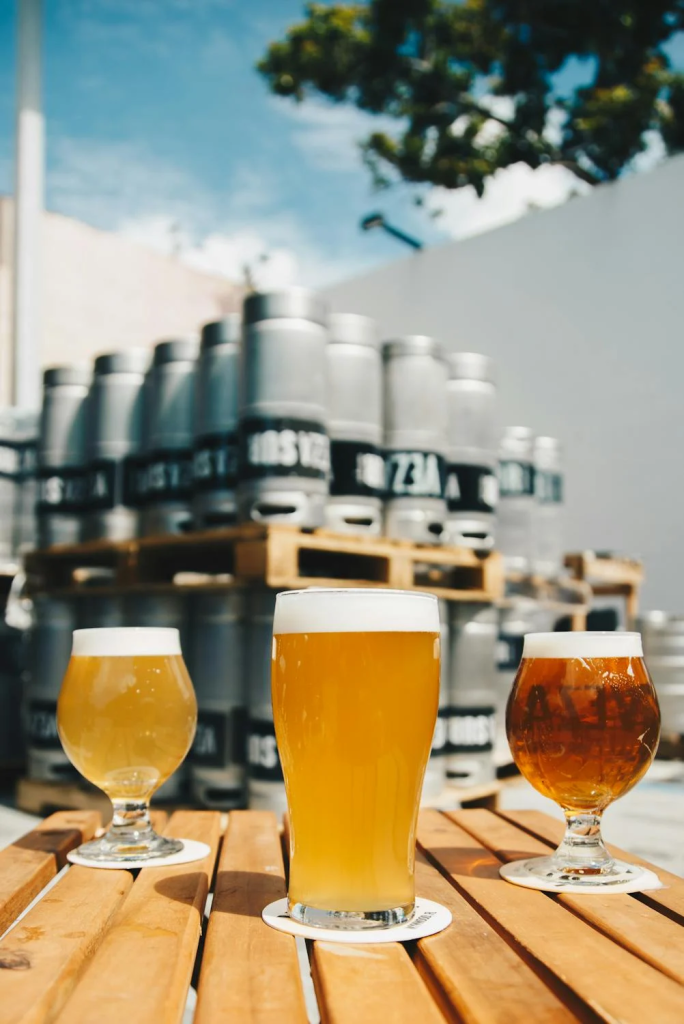At its core, the alcoholic beverage sector revolves around breweries and distilleries, which each employ their distinctive techniques to produce unique drinks. The primary activity of breweries is the production of beer. Various varieties of beer are made by fermenting a combination of malted barley, hops, and yeast.
Spirits like vodka, gin, rum, and whiskey, on the other hand, are the exclusive purview of distilleries. Distillation, a multi-step process that often requires ageing to improve flavour, is involved in this.

Fermented liquids are heated to separate alcohol from other components. The world’s beverage fans rely on breweries and distilleries for a wide variety of tasty drinks, and these establishments also provide fascinating insights into the science and art of making these drinks through tours and tastings.
What Is Breweries And Distilleries?
Breweries and distilleries are facilities where alcoholic beverages are produced, but they focus on different types of drinks and use different processes.
- Breweries: These are places where beer is made. The process involves brewing, which includes combining water, malted barley (or other grains), hops, and yeast. The mixture is fermented to produce beer. Breweries can range from small craft operations to large industrial facilities.
- Distilleries: These are places where spirits, such as whiskey, vodka, rum, and gin, are produced. The process involves distillation, which is heating a fermented liquid to separate alcohol from the water and other components. Distilleries often use ingredients like grains, fruits, or sugarcane, and the resulting spirits are usually aged in barrels to develop their flavours.
Both types of facilities may offer tours, tastings, and events, providing insight into the production processes and the opportunity to sample their products.
Where To Find The Best Brewery & Distillery in Mornington Peninsula?
The Mornington Peninsula is known for its vibrant craft beverage scene, with several excellent breweries and distilleries to explore. Here are some top recommendations:
Breweries
- Mornington Peninsula Brewery: Located in Mornington, this mornington peninsula breweries offers a range of craft beers, from IPAs to stouts. Their tasting room is a great place to sample their brews and enjoy a relaxed atmosphere.
- Red Hill Brewery: Situated in Red Hill, this brewery is known for its high-quality, small-batch beers. They offer a variety of ales, lagers, and seasonal brews, and the brewery is set in a picturesque location with a welcoming vibe.
Distilleries
- Bass & Flinders Distillery: Located in Dromana, Bass & Flinders produces a range of premium spirits, including gin and brandy. They offer distillery tours and tastings, showcasing their craft and dedication to quality.
- Kilderkin Distillery: Found in Red Hill, this distillery focuses on producing small-batch spirits, including gin and whisky. They emphasize traditional methods and local ingredients, and their tasting experiences are well-regarded.
These spots not only offer exceptional beverages but also provide a glimpse into the local craft beverage culture.
What Is The Oldest Brewery In Australia?
Of all the breweries in Australia, Hobart, Tasmania’s Cascade Brewery is the oldest. Almost two centuries have passed since its establishment in 1832. In addition to continuing to produce a diverse array of beers, Cascade Brewery has long been recognized as an important historical site in Australia’s brewing industry.
Here’s more for you to know about the oldest breweries in Australia:
- Carlton & United Breweries (CUB): Founded in 1835 in Melbourne, CUB is one of the oldest and largest brewing companies in Australia. It was originally known as Carlton Brewery and has a rich history of brewing some of the country’s most iconic beers.
- Furphy Brewery: Established in 1864 in Geelong, Victoria, Furphy Brewery has been a staple in the Australian beer scene. It was known for its strong local presence and has recently experienced a resurgence in popularity.
- Tooheys Brewery: Founded in 1869 in Sydney, Tooheys Brewery is another historic brewery with a long-standing reputation. It is now part of Carlton & United Breweries but retains its distinctive brand and heritage.
These breweries have played significant roles in shaping the Australian beer industry and continue to be influential in the craft beer scene.
What Are Breweries Used For?
Breweries are facilities specifically designed for the production of beer. Their primary functions include:
- Brewing: This is the process of creating beer from raw ingredients. Breweries combine water, malted grains (usually barley), hops, and yeast to produce beer. This process involves several stages, including mashing, boiling, fermenting, conditioning, and packaging.
- Fermentation: Breweries provide the necessary environment for yeast to ferment the sugars in the malted grains, converting them into alcohol and carbon dioxide. This is a crucial step in developing the flavour and alcohol content of the beer.
- Quality Control: Breweries conduct quality control and testing to ensure that the beer meets certain standards for flavour, aroma, and consistency. This involves both chemical analysis and sensory evaluations.
- Packaging: Once the beer has matured and met quality standards, breweries package it for distribution. This can include bottling, canning, or kegging, depending on the brewery’s setup and market.
- Innovation: Many breweries also focus on innovation, experimenting with new ingredients, brewing techniques, and styles to create unique and diverse beers.
- Visitor Experiences: Breweries often offer tours and tastings, providing visitors with an opportunity to learn about the brewing process, sample different beers, and experience the brewery’s history and culture.
Breweries are specialized facilities that transform raw ingredients into beer while ensuring quality and consistency in their products.
How Do I Choose The Best Beer?
Choosing the best beer depends on your taste preferences and what you’re looking for in a beer. Here are some tips to help you find a beer you’ll enjoy:
- Know Your Preferences: Determine what flavors and styles you generally like. For example, do you prefer light and refreshing beers like pilsners and lagers, or do you enjoy richer and more complex flavours found in stouts and IPAs?
- Understand Beer Styles: Familiarize yourself with different beer styles. Some common ones include:
- Ales: Includes Pale Ale, IPA, Brown Ale, and Belgian Ale.
- Lagers: Includes Pilsner, Helles, and Bock.
- Stouts and Porters: Rich and dark with flavours like coffee, chocolate, and caramel.
- Sours: Tart and tangy, often with fruity or funky flavours.
- Read Labels and Descriptions: Check the beer’s label or description for information about its flavour profile, ingredients, and alcohol content. Many breweries provide tasting notes that can help guide your choice.
- Try Samplers or Flights: Many breweries and bars offer sampler trays or flights, allowing you to taste a variety of beers. This can help you explore different styles and find what you like.
- Ask for Recommendations: Don’t hesitate to ask bartenders, servers, or friends for recommendations based on your taste preferences. They can often suggest beers that you might enjoy.
- Consider Food Pairings: Think about what food you’ll be enjoying with the beer. Some beers pair better with certain dishes, enhancing both the beer and the food.
- Experiment and Explore: Beer is diverse and there’s a lot to discover. Don’t be afraid to try new styles or breweries to expand your palate.
The best beer is one that you enjoy and find satisfying. Exploring and experimenting with different beers will help you find your favourites.
Conclusion
It all comes down to personal opinion and what you’re looking for in a drink when deciding which beer is the best. To choose beers that suit your taste, familiarize yourself with the several varieties, study labels to learn about the beer’s flavour profile, and try out a few different kinds. You can choose a beer that suits your taste, whether it’s a stout with deep, nuanced notes or a lager with a light, crisp profile.
Make better beer choices with the help of samplers, pairings, and suggestions. Finding and enjoying your favourite beers is important since, in the end, the finest beer is the one you drink.
